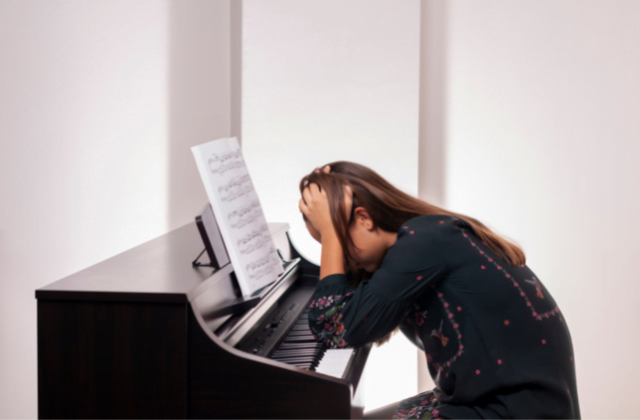
This article about salvaging “off-day” music lessons with neurodivergent students was written by Rosemarie Penner. Rosemarie Penner is an analytical creative … plus online piano teacher and composer at “Must Love Music”! She loves to make learning simple, fun and interactive. When not writing articles (like this one), she enjoys reading and playing video games. For creative ideas and resources, visit Must Love Music.
While I love teaching neurodivergent students, there is one thing every teacher needs to keep in mind: No student is going to behave perfectly all the time. This is especially true when working with neurodivergent students.

At some point, your neurodivergent student will have an off-day or month. They can only be on their best behaviour with you for so long before the damn breaks.
Unlike with neurotypical students, the behaviours you will see on an off-day will be more noticeable. That’s because often your student will have given signals earlier which either you or someone else ignored.
Think about when you’re having an off-day. The first thing to go wrong was probably okay. Annoying, but dealt with. You may give off body language signs telling people to back off a bit. But if those signals are ignored or missed and things keep going wrong…well, this is the perfect recipe for anyone to get upset.
It takes effort from either yourself or someone else to pull you out of the negative mindset. Once this happens, your day can miraculously turn around and the negative things stop (or least become less annoying).
Here are a few tips and tricks to help your neurodivergent student go from “Lesson was grim…” to “Lesson was great!”
Change the Script
One of the master teachers I worked with told me, “You’re the adult. They’re the child. It’s up to you to keep calm and solve the situation.” As much as it can suck at times to “adult”, it really is up to you to change the script.
This can be anything from changing the:
- Location – get off the bench, go outside
- Level of activity – do something physically active so your student can work off their excess energy or emotion
- Expectations – try micro-tasks like playing 1 measure with the correct rhythm and don’t worry about the notes (even if this is something they could successfully do their last lesson)
But, what can this look like in a practical sense?
Tying Those All Together
Let’s look at a real-life example. One of my former students had severe ADHD. Over the years that I taught him, we went through stages where they were adjusting his medication levels so there was a good balance between focus and behaviour.

If you aren’t familiar with this medication-changing process, there are different medication levels for cognitive focus and behavioural compliance. Too high and behavioural compliance is there, but cognitive function and what makes the person uniquely them is lost. Too low, behaviour spirals out of control and cognitive function doesn’t have a chance to shine. You want the Goldilocks zone where there are some possible minor behavioural issues, but maximum cognitive function. This zone changes over time because of weight gain, hormones and a host of other things all related to kids getting older.
Change the Location
During these transitional stages, my student would run 3 laps around the center wall of their home in between activities. It changed the location, let him be active, and kept him to reasonable expectations.
Change the Level of Activity
On the days when he was having an especially hard time focussing, he played the piano standing up. This allowed him to have micro-movements all lesson.
Change the Expectations
Rather than expecting my student to focus fully while going through these medication-changing stages, I would break down our practice to just 1 – 2 notes at a time. Even one bar (measure) tended to be too long at that point, so the success of playing just a few notes in a row was a big thing for him.
Using these strategies took us from zero focus to some piano time with lots of movement (both learning and free form.)
Diffuse Anxiety and Frustration
Usually when music lessons are going wrong, your neurodivergent student is anxious or frustrated.

This may have absolutely nothing to do with you and could’ve been in the works before their lesson even started.
Open Lines of Communication
Talking with your student, if they are open or able to, is a great option. Being a no-judgement sounding board can make all the difference.
Involve Parents (in a good way)
What do you do if your student leaves the room? Talk with their parent instead. There have been several lessons (usually at the beginning of our studio relationship) where this has happened.
These moments have been pivotal in strengthening the relationship I have with families.
Every single time a neurodivergent student walked out, their parent was stressed that I would be upset with their child and worried what it would mean for future music lessons.
Parents need to hear that you understand and you’re on their child’s side.
End on a Positive
Always end the lesson by letting your student know you are glad you got to spend time with them. They need to know your feelings haven’t changed because a lesson didn’t go well.
You can get 7 more ideas on how to diffuse anxiety and frustration here. While this article focusses on lessons before the holidays (when you are most likely to see behavioural outbursts), these tips and ideas work all year round.
Turning the Lesson Around
Being up front with both parents and students that an off-day is going to happen has made all the difference in my studio. Ironically, acknowledging it as a simple fact reduced the stress for all of us!
Understanding that a “bad” lesson doesn’t have to stay that way also means your student can learn important strategies, their parents are reassured they made the right choice and you get to end your teaching day on a positive note as well!
Which idea will you try with your neurodivergent student?
The next time you need music lessons with a neurodivergent student to go from meltdown to marvellous, try one of these strategies. Let me know how it goes in the comments below.
For more resources on teaching students with special needs, Nicola has an entire section of resources for that on her centralised Planning Lessons hub page.
